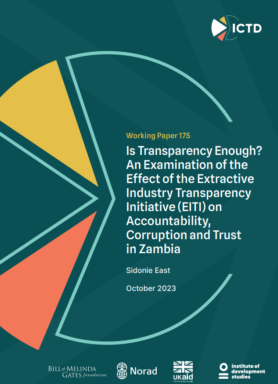Working Paper 175
The Extractive Industry Transparency Initiative (EITI) is the leading global transparency standard for the extractive industry. It aims to improve governance standards in the extractive industry by providing a public platform for information sharing and multi-stakeholder dialogue. However, the success of the initiative has been brought into question by numerous scholars. This paper aims to shed new light on this work by presenting a unique analytical framework. The framework hypothesises that improved transparency, through the EITI, can lead to improved extractive industry governance: increased accountability, reduced corruption and increased trust. However, this improvement of governance can only take place when combined with three scope conditions: 1) transparency condition, 2) publicity condition, and 3) accountability condition. The paper applies this framework to the single case study of Zambia, and finds that the EITI has failed to meaningfully improve these three governance outcomes in the extractive industry in Zambia. The paper argues that the reason for this is that none of the three necessary scope conditions are sufficiently present. The paper advocates for policymakers to support the growth of these three conditions in contexts of poor extractive industry governance, to ensure transparency standards have meaningful impact.
